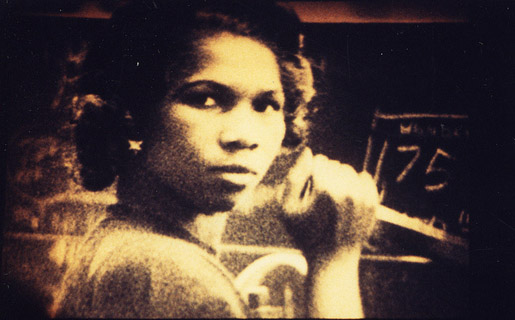
20 November 2013 20:30, Cinematek Brussels. In collaboration with le P’tit Ciné.
Talk with John Akomfrah proceeded by a screening of Handsworth Songs.
Black Audio Film Collective, Handsworth Songs
1986, 16mm, color & b/w, English spoken, French subtitles, 60′
“People assume that there are certain transcendental duties that Black filmmaking has to perform. They assume that and because of that Black filmmaking has to work with the understanding that it’s in a state of emergence. And because it is in a state of emergence its means always have to be guerilla means, war means, signposts of urgency. When that begins to inhibit questions of reflection- doubt, skepticism, intimacy and so on- then the categorical imperative does exactly what it is supposed to do- it imprisons.”
– John Akomfrah
“There are no stories in the riots, only the ghosts of other stories”. The phrase lingers over the film like a haunting refrain, reverberating across and between the ghostly traces of lived moments floating over the surface of the screen, somewhere between faded history and tainted memory, between the historical and the allegorical. Handsworth Songs was the first film John Akomfrah made with the Black Audio Film Collective, a group of artists, critics and filmmakers who set out to intervene in the cultural debate about black identity and representation that was raging all over Britain in the 1980’s. The spark that lit the fire was arguably the “civil disorder“ of 1981, when a wave of violent unrest swept through some of England’s inner cities. It was this event that painfully exposed the gap between the dominant discourses on ethnicity and “Britishness” and what was intimately felt and experienced by the “bastard children of 1968”, those who were profoundly shaped by what Derek Walcott called “the absence of ruins”. The challenge then, became one of generating counter-narratives, to look for aesthetical forms which would allow for a space to deconstruct the hegemonic voices and articulate states of belonging and displacement in dissensual ways. The question of form turned out to be one of dealing with absence: the lack of “ruins” made it necessary to look into the dark mirror of the past in search of images, words and sounds to attest to the intangible presence of diasporic histories. In Handsworth Songs, a response to the second Handsworth riots in 1985, Akomfrah discards the didactic panoptic impulse of the documentary film tradition in favor of a polytonic structure in which eye-witness accounts, mediated voice-overs and a mosaic of sounds intersperse with a poetic montage of archival footage. It is here, in unearthing the phantom narratives of the past to give them a new place in the present as a promise to the future, that can be found the essence of john Akomfrah’s work, up until this day.
DISSENT ! is an initiative of Argos, Auguste Orts and Courtisane, in the framework of the research project “Figures of Dissent” (KASK/Hogent), with support of VG & VGC.
On 21 November John Akomfrah will also be presenting his film Testament at KASKcinema, Gent.
The visit of John Akomfrah has been made possible with the support of Brussels Arts Platform and VUB Doctoral School of Human Sciences.
——————————————————————————————————————————————————————-
About DISSENT!
How can the relation between cinema and politics be thought today? Between a cinema of politics and a politics of cinema, between politics as subject and as practice, between form and content? From Vertov’s cinematographic communism to the Dardenne brothers’ social realism, from Straub-Huillet’s Brechtian dialectics to the aesthetic-emancipatory figures of Pedro Costa, from Guy Debord’s radical anti-cinema to the mainstream pamphlets of Oliver Stone, the quest for cinematographic representations of political resistance has taken many different forms and strategies over the course of a century. The multiple choices and pathways that have gradually been adopted, constantly clash with the relationship between theory and practice, representation and action, awareness and mobilization, experience and change. Is cinema today regaining some of its old forces and promises? Are we once again confronted with the questions that Serge Daney asked a few decades ago? As the French film critic wrote: “How can political statements be presented cinematographically? And how can they be made positive?”. These issues are central in a series of conversations in which contemporary perspectives on the relationship between cinema and politics are explored.